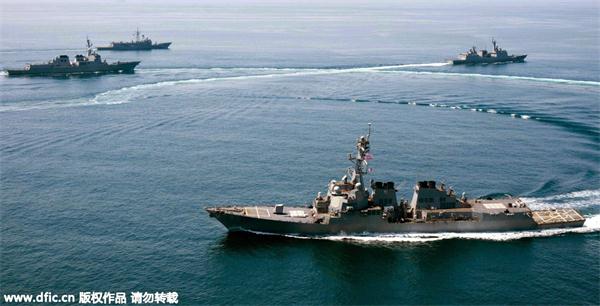Arbitration court's ruling against China's sovereignty exception
(China Daily) Updated: 2015-11-03 07:52
 |
|
The guided-missile destroyer USS Lassen (front) conducts a trilateral naval exercise with the Turkish and South Korean Navy on May 25, 2015. [Photo/IC] |
China's foreign ministry on Friday dismissed a ruling by the Permanent Court of Arbitration based in The Hague, the Netherlands, which said it has jurisdiction over island disputes between China and the Philippines in the South China Sea. Comments:
It is appalling that The Hague-based tribunal made such a claim in the case unilaterally brought by the Philippines concerning islands in the South China Sea, disregarding all objective voices. This ruling may deal a major blow to the trust within the international community, and will not help Beijing and Manila solve their territorial dispute. What is behind the latest jurisdiction is that Manila has deliberately made a far-fetched connection between sovereignty and maritime issues, and the United Nations Convention on the Law of the Sea, posing a grave challenge to international law.
Jia Yu, deputy director of the China Institute for Marine Affairs attached to the State Oceanic Administration, Oct 31
In essence, the court's "jurisdiction" over the South China Sea islands is nothing but a geopolitical game being played by the United States and the Philippines. There is no evidence showing that The Hague's ruling was related to the US' guided-missile destroyer USS Lassen sailing through China's territorial waters around Zhubi Reef in the South China Sea on Oct 27, but it did enable the two Asia-Pacific allies to keep pressuring China in the region.
Yu Zhirong, a researcher with the China Maritime Development Research Center, Oct 30
The Chinese government has sufficient legal evidence to dismiss the Permanent Court of Arbitration's decision, because it made clear as early as 2006 that the court cannot rule on its sovereignty issues and proved its historical ownership of territory. Manila's provocation will not affect Beijing's sovereignty rights and jurisdiction in the South China Sea.
Liu Feng, a senior researcher at the National Institute for South China Sea Studies, Oct 30
The international tribunal's ruling is not conducive to stabilizing the situation in the South China Sea, and might offer a convenient excuse for some parties to intensify the tensions in the region. The best solution to the territorial disputes lies in direct negotiations between the relevant countries, which are supposed to shelve their unsettled differences, and not leave a ticking time bomb in their relations.
Global Times (Chinese edition), Oct 30











